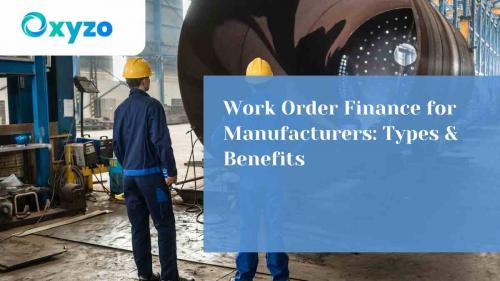Work Order Finance for Manufacturers: Types & Benefits

In the manufacturing industry, efficient cash flow management is crucial for sustaining operations and driving growth. Work order finance has emerged as a valuable financing option that can help manufacturers overcome cash flow challenges. This blog post aims to provide a comprehensive understanding of work order finance, its types, and the benefits it offers to manufacturers.
Section 1: What is Work Order Finance?
Work order finance is a financing solution specifically designed for manufacturers. It involves leveraging the value of purchase orders or work orders from reliable customers to access immediate working capital. Essentially, it bridges the gap between fulfilling orders and receiving payment by providing upfront funding.
Section 2: Types of Work Order Finance
Purchase Order Financing: This type of work order finance involves obtaining funds to cover the cost of fulfilling a specific purchase order. It enables manufacturers to secure the necessary raw materials and labor required to complete the order.
Work-in-Progress (WIP) Financing: WIP financing focuses on providing funding for work that is already in progress. Manufacturers can access capital based on the value of the work completed, allowing them to continue operations smoothly.
Invoice Factoring: Although not strictly work order finance, invoice factoring is often used in conjunction with work order financing. It involves selling outstanding invoices to a third-party company, known as a factor, in exchange for immediate cash.
Section 3: Benefits of Work Order Finance for Manufacturers
Improved Cash Flow: By accessing funds based on confirmed purchase orders, manufacturers can overcome cash flow gaps and ensure smooth operations without relying solely on customer payments.
Fulfilling Larger Orders: With work order finance, manufacturers can take on bigger projects that require substantial upfront investments. This enables them to seize growth opportunities and expand their customer base.
Supplier Negotiations: Work order finance allows manufacturers to negotiate better terms with suppliers. By having access to upfront capital, they can negotiate volume discounts or early payment discounts, reducing overall production costs.
Increased Profitability: By leveraging work order finance, manufacturers can fulfill orders efficiently and meet customer demand promptly. This improves customer satisfaction, enhances reputation, and ultimately leads to increased profitability.
Conclusion:
Work order finance offers a viable solution for manufacturers looking to overcome cash flow challenges and optimize their operations. By understanding the different types of work order finance available and the benefits they offer, manufacturers can make informed decisions to drive growth and achieve long-term success."
Advertise on APSense
This advertising space is available.
Post Your Ad Here
Post Your Ad Here
Comments